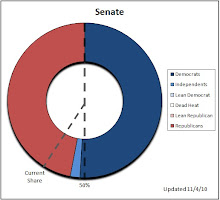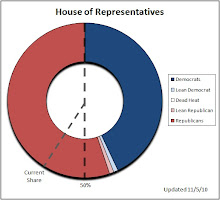I am always skeptical of other people's ideas. I guess I am just used to people having a completely different view of what it means to be a conservative. So, before I jumped on the FairTax bandwagon, I wanted to see what it is all about.
First of all, the Fair Tax would eliminate all "federal personal and corporate income taxes, gift, estate, capital gains, alternative minimum, Social Security, Medicare, and self-employment taxes." Great start!
For federal revenue, it instead relies on "one simple, visible, federal retail sales tax administered primarily by existing state sales tax authorities."
This would allow for us to completely eliminate loopholes in the tax structure and the IRS.
Questions?
How can one sales tax raise revenues equal to what all of those other taxes bring in?
Multiple independent economists have reviewed the Fair Tax proposal and determined that a national sales tax of 23% (or 30%... more on the difference in a minute) would produce revenue equal to current federal revenues once all factors are considered.
But isn't a sales tax regressive?
The Fair Tax takes that into consideration. That's why, as part of the proposal, they suggest a universal "prebate" which would send every household a check at the beginning of every month. This check would be equal to the estimated necessary expenses for the household, adjusted for the number of people in it. Here's a chart that demonstrates what this would mean to families of different sizes:

This prebate ensures that the amount of taxation never exceeds what a person is able to pay and that a person living at or below the poverty line would pay no net taxes.
Why a sales tax?
Sales taxes make the most sense for a lot of reasons. First of all, it removes the disincentive to work more by taking the government's hand out of our paychecks. It removes the heavy burden on businesses that the highest corporate taxes in the world present.
Plus, from a purely economic standpoint, sales taxes are far more reliable than income taxes as a source of revenue.

This graph depicts personal income and personal consumption in the United States since 1973. While they both very closely follow the overall trajectory of the economy, if you look closely you can see that the red line, denoting expenditures, does not dip as far down or jump as far up.
This has also been demonstrated to be reflected in tax revenue. States that rely more heavily on the income tax tend to have far more of a boom or bust cycle with the economy. This leads to an expansionary government during good times and large amounts of debt during bad times.
A sales tax does a better job of flattening out government revenues which is much better for public policy.
How would this effect international trade?
This was probably my biggest question concerning the policy of a sales tax only system. If we suddenly jacked up sales tax rates by 20-30% across the board, wouldn't that increase the cost of domestic goods and therefore encourage people to import more and lead to fewer exports?
It turns out they came up with a solution to that too. Apparently other countries have been handling this for years. What they do is they tax based on consumption, not production. An item is only taxed at the retail level. Therefore, if you are a consumer in the United States, you would pay the US sales tax on any item purchased here or abroad. If it is imported, then you will pay a Value-Added tax. If you are a consumer abroad, you will pay your nation's tax on the good once it arrives.
Apparently, the way the system works right now, American goods are already at a significant disadvantage in international trade. Because we tax every item at every point along the way, the prices of our goods are already inflated. By consolidating taxes to the point of retail, some estimates show that initial prices would drop by 15-20% across the board. That means that this would actually equal the playing field and help businesses in international trade. If anything, it would help the nation balance its trade deficit and, by eliminating corporate taxes, help to reverse the trend of businesses moving out of the country.
So what's with the 23% or 30% thing?
Well, this is where it gets a little complicated. Basically, there are two ways to describe a tax: inclusive tax rate and exclusive tax rate. Let's say you have $10 and I take from you $1. Well, that would be an inclusive tax rate of 10%. Basically, the tax of $1 is 10% of the total amount, including what was taken away.
Now, what you have left over is $9. That means that you lost 11.1% of what you now have, which is the exclusive tax rate. Sales taxes are typically described in this way because you see the before tax total and add a percentage of that number. This creates some confusion in this debate.
So what would the Fair Tax propose? It would propose a 30% exclusive tax rate, which comes out to 23% inclusive tax rate. The 23% number is a better comparison for income taxes which we tend to use inclusive tax rates to describe. The 30% number is better for comparing to other sales tax rates.
Let's say the Fair Tax is enacted and you want to buy a $100 item at the store.
You would pay $130.
$30 = 30% of $100
$30 = 23% of $130
In the end, you get something worth $100 and pay $30 in taxes.
Now, for an income tax you have to work backwards. The best comparison is how do you wind up with $100, paying $30 in taxes?
With an income tax rate of 30%, you will have $100 left if you earn $142.
With an income tax rate of 23%, you will have $100 left if you earn $130.
That is why it is best to use the 23% number when you are comparing the sales tax to the income tax.
Anything else?
All of this information and so much more is available at the FairTax web site which I have provided a permanent link to over on the sidebar to the right---->
Also, I think an additional point for why this Fair Tax would be so great is how simple it is. It's good for so many reasons, not the least of these is transparency. People have no clue how much of their money right now goes towards taxes. Everything we purchase is taxed at every stage of production and everything we make and spend is taxed at every point along the way. Our entire economic system is mired in taxes everywhere and at all times. We have just grown accustomed to it. Imagine a simple system, instead, where the government can't hide its tax increases. Nobody can hide in loopholes and suddenly our tax system isn't subject to special interests. Also, people will suddenly be able to make a clear connection between increases in taxes and its effect on their pocketbook. There is something refreshing about the idea that people will be reminded every time they go to the grocery store exactly how much the tax rate is and immediately know whenever Congress decides they need to bump up their taxes to pay for some new program. Can anybody say return of fiscal responsibility?
Well, if you have any further questions, go to the web site yourself and look around.
They did a lot of research and put a lot of work into it. I think they have covered all of their bases and I truly think this would be the ideal tax system.
I wish I'd thought of it first!










No comments:
Post a Comment